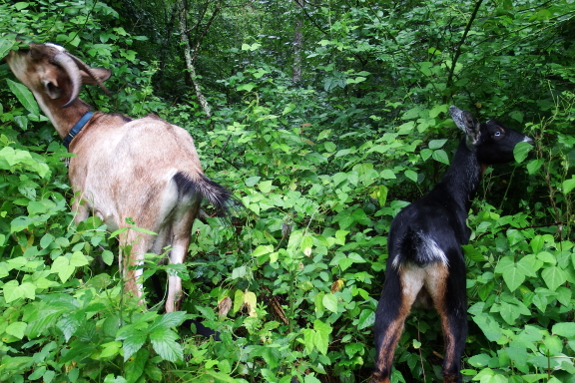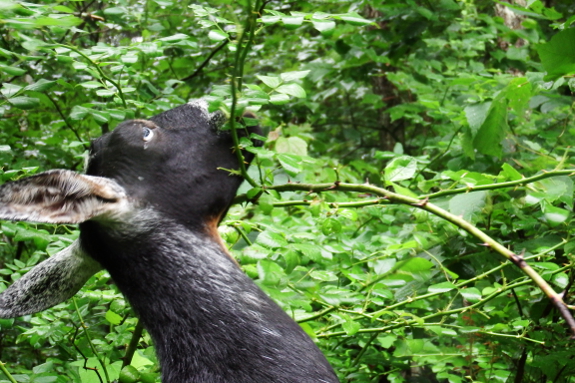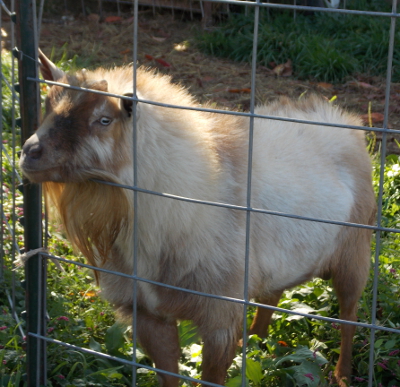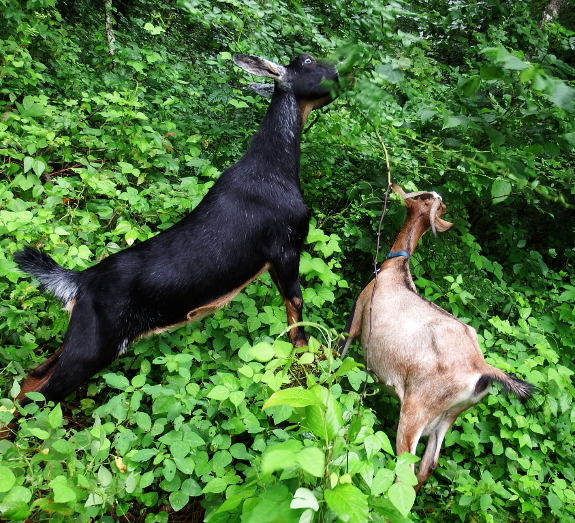
Goat breeding options

It's time for us to cross another goat-keeping hurtle --- breeding our does. I was hoping to do this the lazy way, letting our buckling
mate with our (unrelated) doeling this summer for a fall birth. But
Lamb Chop didn't mature fast enough to do the deed before my
self-imposed deadline, and any matings now would result in kids being
born too late in the season to be safe.

So we've got a bit of
breathing room to figure out a better way to get our does knocked up.
For an early April birth, we'd need to breed our does in early November.
Which seems like a lot of time to make up our minds...but probably
isn't.
There are lots of ways to
find goat sperm, which vary in dependability, safety, and quality.
Honestly, Mark and I would prefer artificial insemination (AI) for our high-class doeling
for reasons of safety and since she's a quality goat whose offspring
could be equally high quality (if dad supplies the right genes). But we
haven't found anyone local who can do goat AI, and driving a few hours
to get our goat bred could be problematic if the first time doesn't
take. (Success rates with frozen semen run about 60% with goats.)
Option 2 is to buy a
liquid nitrogen tank and supplies so we can inseminate on our own. My
understanding is that this would cost about $500 (plus ongoing liquid
nitrogen costs), which seems pretty expensive for goat sex.
 Option
3, the simplest and probably cheapest option, is to find a local buck
whom our does can have a date with. The trouble is that I'm working hard
to keep our farm's parasite levels very low, so I wouldn't want a
run-of-the-mill buck sleeping over and spreading his worms. (All goats
have worms, and if you've been deworming your herd monthly the way most
people around here do, those worms are most likely vermicide-resistant
"superbugs." Doesn't sound good, does it?) And the bucks I've heard
about nearby probably won't produce offspring that are worth keeping,
which would be a shame since a daughter of Artemesia's could potentially
be a top-notch goat. The closest milking-quality Dwarf Nigerians or
Mini-Nubians (Artemesia's breed) that I've found so far are a couple of
hours away, which adds another layer of complication to the breeding
endeavor if I want to produce keeper kids.
Option
3, the simplest and probably cheapest option, is to find a local buck
whom our does can have a date with. The trouble is that I'm working hard
to keep our farm's parasite levels very low, so I wouldn't want a
run-of-the-mill buck sleeping over and spreading his worms. (All goats
have worms, and if you've been deworming your herd monthly the way most
people around here do, those worms are most likely vermicide-resistant
"superbugs." Doesn't sound good, does it?) And the bucks I've heard
about nearby probably won't produce offspring that are worth keeping,
which would be a shame since a daughter of Artemesia's could potentially
be a top-notch goat. The closest milking-quality Dwarf Nigerians or
Mini-Nubians (Artemesia's breed) that I've found so far are a couple of
hours away, which adds another layer of complication to the breeding
endeavor if I want to produce keeper kids.
Option 4 is to buy a
buck, presumably one with good genetics and who has a clean bill of
health. The trouble here is that our farm is small and our
infrastructure is minimal, so we wouldn't really have anywhere to keep
him. Granted, if he didn't cost too much, we could simply buy a buck in
the fall, make sure he mates with our does, then eat him, which would
lower the hassle factor dramatically. But high-quality bucks tend to
cost high-quality money, making it less feasible to turn him into
sausage after he breeds with our does. And there's still the parasite
issue to consider.

I'd be curious to hear
from more experienced goatkeepers among you. Is there an option I'm
missing? And, given our goals and infrastructure, which breeding
technique would you choose? I suspect November will be here before we
know it, and it would be great if I had our breeding plans all lined up
before those fall heats.
Want more in-depth information? Browse through our books.
Or explore more posts by date or by subject.
About us: Anna Hess and Mark Hamilton spent over a decade living self-sufficiently in the mountains of Virginia before moving north to start over from scratch in the foothills of Ohio. They've experimented with permaculture, no-till gardening, trailersteading, home-based microbusinesses and much more, writing about their adventures in both blogs and books.
Want to be notified when new comments are posted on this page? Click on the RSS button after you add a comment to subscribe to the comment feed, or simply check the box beside "email replies to me" while writing your comment.

I'd take your girls to their boyfriend and let them board for a bit. Bucks are a Nuisance, generally, and unless you have more than two or three does to breed, this is a lot less trouble all round. What is your worming program, by the way? Can't remember if you've mentioned it?
I would go for option 4:
Purchase said young breeding buck with clean bill of health, let him do his wonderful deed, waiting two cycles just to be sure, then let him reside in freezer camp to fill your bellies with delectable goat meat all winter!